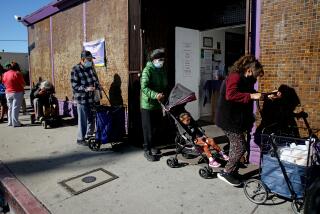Report on Boosting Poor Areas Will Be Focus of Discussion
- Share via
A report that recommends ways to spark economic development in L.A.’s poor minority neighborhoods will serve as a launching point for a discussion today by the Los Angeles mayoral candidates, business executives and community leaders.
The report, published by the nonprofit Operation Hope and UCLA’s Anderson School, stemmed from Operation Hope’s Inner-City Economic Summit held in South Los Angeles last year.
It distills the discussions by bankers, academics and community-development experts into a primer on what holds back neighborhoods and what must be done to reverse trends of poverty and isolation. The report calls for improving access to capital, enhancing technology training, opening up small business opportunities and increasing homeownership in disadvantaged areas.
Operation Hope Chief Executive John Bryant said the report stresses the importance of education as a key to solving many of these problems, noting that an understanding of predatory lending practices can help home buyers avoid disastrous mistakes.
Distributed to 10,000 corporate, government and academic leaders, the report should encourage investment as well as innovative collaboration, he added.
The ideas raised are sweeping and far from new: They include calls for improved education, safer streets, more equity financing for minority entrepreneurs and economic education and savings programs to foster homeownership.
But backers of the report say it serves an important purpose in sparking discussion of the issues, particularly in an election year. Former Assembly Speaker Antonio Villaraigosa and City Atty. James K. Hahn have agreed to attend a UCLA event today to discuss the report, which is being released to correspond with the April 29 anniversary of the 1992 riots.
“It supports everything that we think needs to be done in some of these neighborhoods in terms of really building on homeownership and economic literacy and making them safer,” said United Way of Los Angeles President Joe Haggerty, among the co-hosts of today’s discussion.
Fully 19% of Los Angeles County residents lived at or below the federal poverty line in 2000, he said. Although that figure is down from 23% three years ago, it is still above the national average of about 13% to 15% for major metropolitan areas and “has got to be an issue for the mayoral candidates.”
Issues of worker training and access to financial services--among the plethora of report topics--are particularly thorny here because of high immigration rates, he added. The United Way has launched its own initiatives to finance economic literacy for home buyers and organizations that manage Individual Development Accounts. The accounts provide savings matches toward down payments, education or business opportunities for low-income participants who undergo literacy training.
The Urban League of Los Angeles also is co-hosting the event, along with Anderson School Dean Bruce Willison.
Thomas Tseng, director of marketing for Los Angeles-based Cultural Access Group and the report’s author, said its value lies in bringing together, “in a holistic fashion,” issues often tackled in isolation.
“It looks at [everything] from the economic underpinnings [of poverty] to educational and social infrastructure,” he said. “It goes to show--especially for the mayoral candidates--how far public policy needs to go.”
Although much remains to be done, there are signs of revitalization in neighborhoods that hit bottom nine years ago. For example, Los Angeles City Councilman Mark Ridley-Thomas on Friday released his own economic-development report on his South-Central district. It showed that development projects recently completed or under development total nearly $1.3 billion in value and will bring more than 3,400 jobs to the region.
More to Read
Sign up for Essential California
The most important California stories and recommendations in your inbox every morning.
You may occasionally receive promotional content from the Los Angeles Times.














